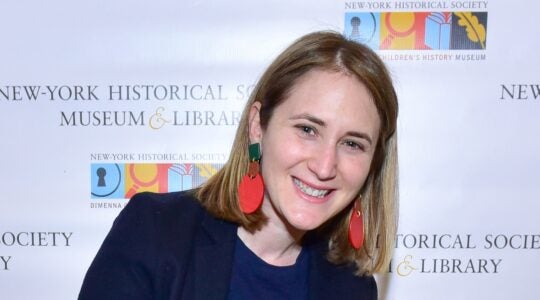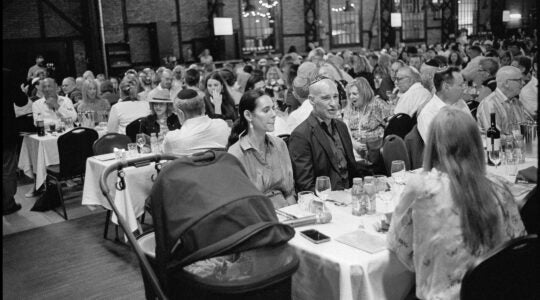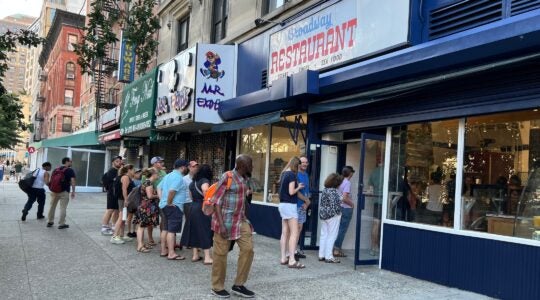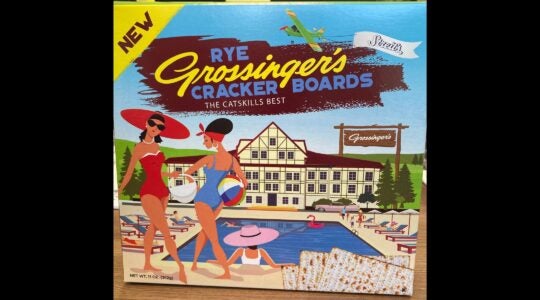At the beginning of the new millennium, just out of the University of Maryland, Erez Safar was establishing himself as something of an outlier in the Jewish music scene here. Based in Brooklyn, he was an outer-borough guy in a scene dominated by Lower Manhattan. He was a creator gliding easily between hip-hop (as DJ Handler) and jazz/klezmer/progressive rock (as a drummer with Juez, which sounded like a funky blend of Lenny Pickett, the Microscopic Septet and the Klezmatics). He started his own record label, modular moods, and he helped a lot of rising artists break through, most notably the black and Orthodox hip-hop singer Y-Love.
Through it all, though, he said, something was missing.
“When I started getting into Jewish music, [it was through] John Zorn and the Knitting Factory,” he said in a phone interview from Los Angeles, his new home base. “I was getting into jazz and klezmer mixed with jazz. It was awesome, but it was all Eastern European-based music. I wasn’t hearing anything representing my mom’s side, which is Yemenite.”
When the family was in Israel, Safar would be taken to Yemenite synagogues regularly, and there he fell in love with the sinuous modes of the music.
“The meter mesmerized me and I always wanted to replicate it in my music,” he said. “I was always trying to find recordings of Yemenite Jewish music and set them to beats. It works really well.”
As much an entrepreneur and producer as a musician, Safar wanted to do more, to build something original.
“I wanted to develop the music on my own, but I also wanted to find out who else was out there doing it and shine a light on that aspect of Jewish music,” he said. “I wanted a lot of people to hear what I was finding.”
He made a simple decision. In 2005 he produced the “First Annual Sephardic Music Festival,” which coincided with Chanukah that winter. The event has been timed to the holiday ever since.
“The festival was a way to get a lot of this culture out there on a grand scale,” Safar told The Jewish Week shortly before the 2006 edition. And he always expected it to be an annual event.
The inaugural edition included a wide-ranging collection of Sephardic and Mizrahi acts like Divahn and Sarah Aroeste, as well as more fusion-oriented sounds like Pharaoh’s Daughter and modular moods artists like Y-Love. Afterwards, Safar was ecstatic.
“Everything was sold out or standing room only,” he said. “You could feel it was something big by the way people reacted.”
Galeet Dardashti, who performed with her group Divahn at the first festival and has been back several times since, told The Jewish Week, “When most New York City folks hear the term ‘Jewish music,’ they assume some variant of klezmer music. The Sephardic Music Festival has not only helped to elevate the awareness of the diversity of the Jewish musical palette but continues to underscore through the performances’ varied approaches — rock, jazz, pop, electronic and various fusions with Middle Eastern traditions — how artists today continue to make these sound heritages their own.”
For Moishe Rosenfeld, president of Golden Land Concerts and Connections, who has had artists he represents appear at the festival, the event is unique because of its diversity. The festival, which he called “groundbreaking,” is “inclusive, in that it often features performers whose work isn’t directly derived from the Sephardic tradition, and it brings a sense of an expanding, vibrant Jewish identity in New York.”
Safar must have tapped into some unstated desire in the New York Jewish music scene. Every year the event has grown, and along the way he has added more bands, more diverse sounds and even liturgical and academic components.
By the fourth year, he was already talking about the need for the festival to reach out to older audiences as well as the 20-somethings who were the original target. (Safar himself is now 35.) That was the year in which the newest feature of the festival was a symposium at the Center for Jewish History; the scholarly component has remained a part of the program.
Things were percolating for the young music mogul. His online presence was enhanced by the creation of Shemspeed, a musical and merchandise clearinghouse, and that allowed to add other elements to his multifarious enterprises; most prominent among them is an “Israeli keffiyeh,” a version of the traditional Middle Eastern scarf worn by Arabs and some Kurds, but with blue Stars of David and the slogan “Am Yisroel Chai” in embroidery.
More significantly, he changed his performing name from DJ Handler to Diwon (That Yemenite Kid), a very public acknowledgement and assertion of his mother’s heritage.
It is ironic that his own music has subsequently evolved away from the Middle-Eastern influences.
“[My music] has become more like indie-hipster mainstream stuff,” he admitted. “My solo album [“New Game,” released last year] was a hip-hop record; it combined hip-hop and roots Americana. And I have my rock project, Dreams in Static, that’s kind of like retro-soul-rock, with hip-hop influences. None of that stuff has anything to do with Sephardic music, so the festival has become my outlet for that music.”
He also has a new production outlet for his music and that of his stable of artists: Bancs Media, a one-stop shopping project that covers everything from studio space to graphic design.
The Sephardic Music Festival has continued to grow, adding a Los Angeles component this spring that included Aroeste and other East Coast festival regulars like Yemen Blues, as well as “the first annual Sephardic Story Slam.” Safar promises a Philadelphia edition next year.
He may not be as involved in the actual music-making for the festival, but he still gets seriously stoked talking about what happens on stage.
“Yemen Blues — the show was incredible,” he said. “I was texting Matis [he has collaborated with Matisyahu numerous times in the past few years], and he wanted to come out and jump on stage with them. The live show was insane, like Prince meets James Brown, Yemenite style!”
Safar said that it’s a challenge to find new bands for the Sephardic Music Festival, but the bigger challenge may be to keep the ship afloat.
“It’s not a big funded festival,” he noted. “We don’t have donors; we put together programs and whoever we’re presenting with will lend financial support. It’s a bit easier in New York because so many of the bands live there.”
He has just begun thinking about this year’s New York event. He doesn’t know yet who will be spending Chanukah with him on-stage. “I’m not thinking about it all year long,” he conceded. “It’s not like I have to start from scratch every year.”
But you can expect the Sephardic Music Festival to continue well past the completion of its first decade this winter. “It’s a passion project for me,” he said. “It ends up capturing a lot of people’s attention.”
For information about the Sephardic Music Festival, visit sephardicmusicfestival.com. Erez Safar’s other websites include http://bancsmedia.com, shemspeed.com and diwonmusic.com.
The New York Jewish Week brings you the stories behind the headlines, keeping you connected to Jewish life in New York. Help sustain the reporting you trust by donating today.




